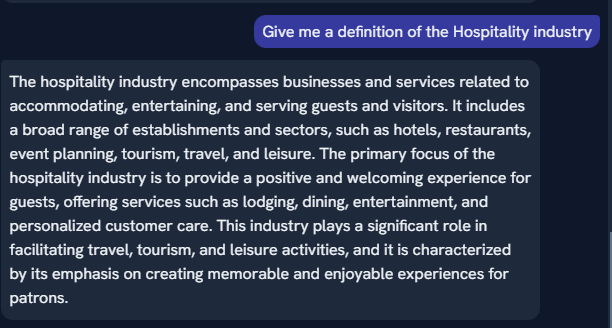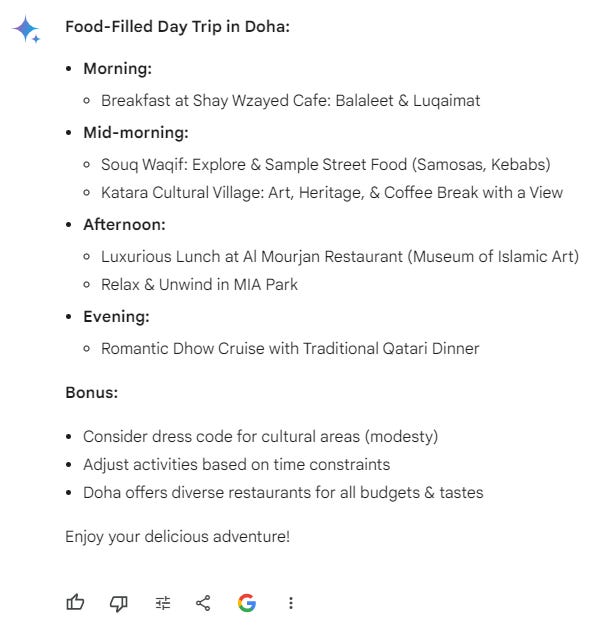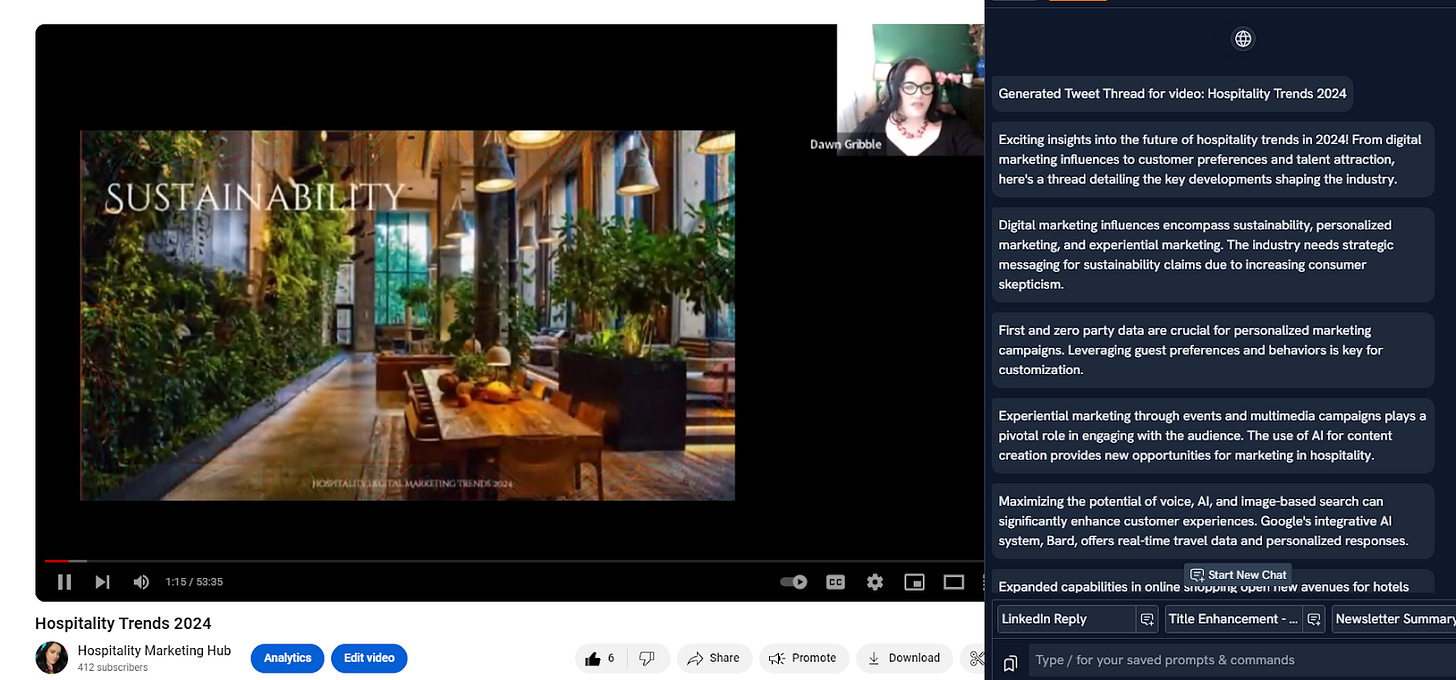Generative AI: What Hospitality Leaders Need to Know
The What, The Why and The How To
“Generative AI has the potential to change the world in ways that we can’t even imagine. It has the power to create new ideas, products, and services that will make our lives easier, more productive, and more creative.”
Bill Gates
Generative AI promises to revolutionise how hospitality businesses interact with customers, streamline operations, and provide personalised service, with opportunities to remain competitive, enhance guest experiences, and drive sustainable value creation.
To take advantage of this new technology and avoid the pitfalls, hospitality leaders must understand its fundamentals and application in the real world.
Contents
What is Generative AI?
Real World Applications for Hospitality
Pros & Cons of Generative AI
Action Plan
Resources & Recommended Reading
What is Generative AI?
Generative AI is a form of artificial intelligence that creates new content in text, images, videos, music, or other media types. It has a broad range of applications, including analysing data, travel planning, generating images for marketing, streamlining operations, producing content and enhancing online customer support with chatbots that offer more natural interactions.
Also known as Large Language Models (LLMs), Generative AI uses prompts to generate output based on the input it receives. Once the prompt is given, the AI model processes the input and uses its pre-trained knowledge, language patterns, and understanding of context to produce a response.
The quality and relevance of the output depend on the specificity and clarity of the prompt, as well as the capabilities of the AI model itself.
Here’s an example using Merlin.ai, which is powered by ChatGPT.
So how are people using Generative AI in their day-to-day lives? here’s a look at the latest stats:
38% of users engage with Generative AI for leisure or educational purposes
70% of Gen Z use the technology, with 52% trusting it to help make informed decisions
55% of marketers that use Generative AI for content creation prefer ChatGPT.
66% of marketers use Generative AI for brainstorming, and 44% to produce email copy.
75% of travellers would trust AI to plan accommodation, 74% for local transport, 72% for work events and meetings, and 70% to assess a trip’s environmental impact.
Real-World Applications for Hospitality
Conversational AI
Tools: ChatGPT and Gemini (previously Bard)
Generative AI can create engaging chatbots for customer service, handling reservations, answering questions about food allergies, and providing information almost instantly. Chatbots powered by these tools can also handle multilingual interactions, ensuring personalisation in the guest's native language. They're effective for out-of-hours customer service and customers who prefer a DIY approach.
Google Maps has launched a new AI tool to help users find new places to eat, stay and visit in a more conversational way than the regular search experience.. This feature analyses Google Map's vast database of 250 million locations as well as 300 million Local Guide contributions and then provides suggestions based on the user's search criteria.
Prompt: Plan a day trip in Doha for a couple who love food
In June 2023, Booking.com launched its new AI trip planner to improve travel planning. Priceline and Tripadvisor quickly followed suit.
Content Generation AI
Tools: Jasper, Writesonic
AI content generation tools can help hotels and restaurants create SEO-friendly website content, including landing pages, about us pages, and service descriptions. These tools can ensure that the content is engaging and informative, and can identify gaps and areas for improvement.
Generative AI is very good at creating content outlines, translations and repurposing content for different communications channels, for example converting a video into a Thread with appropriate hashtags, or generating social media posts from blog posts.
Visual Content Creation
Tools: DALL-E 2, Synthesia, Midjourney
With these platforms, images and videos, from hotel rooms to gastronomic offerings, can be created without photo shoots or production. These tools are helpful for visualising event spaces and repurposing content.
Prompt: photo of Architectural Digest magazine biophilic bedroom, minimalist
Created using Midjourney
Revenue Management
By analysing diverse data points, including market trends, competitor pricing, and historical occupancy and sales data, AI can recommend adjusting prices in response to varying demand levels.
For hotels Generative AI can be equipped with access to historical booking data, could analyse patterns from previous years and then forecast the increase in demand for the upcoming period. It can then dynamically adjust the pricing for room categories to ensure the hotel maximises RevPAR.
During special events or conferences nearby, the AI can suggest room rates that align with the heightened demand, encouraging early bookings at a premium price while offering last-minute discounts to fill any remaining rooms.
For restaurants, generative AI can optimise menu pricing based on factors such as ingredient cost fluctuations, day of the week, and even the average spend of current diners. For instance, if an AI system recognises that seafood dishes are frequently ordered and ingredients are readily available at a lower cost, it could recommend a promotional offer to attract more customers without significantly impacting profit margins.
Generative AI can also assist with personalised pricing – offering special rates to loyalty program members or targeted promotions based on customer preferences.
Business Insights and Data Analysis
Tools: Google Analytics, ProfitSword
AI-driven analytics can tap into vast quantities of data to detect meaningful patterns and predict trends that help businesses stay ahead of market demands.
For instance, by using Google Analytics, general managers can understand where their website traffic is coming from, what pages visitors spend the most time on, and the customer journey that leads to booking a room or table.
Business intelligence AI tools can provide a comprehensive view of operations, assisting in forecasting future booking trends by analysing historical occupancy/order data and market intelligence. By assessing spending patterns in different departments and channels, AI can help identify which services are most profitable and which could be enhanced or marketed differently to improve performance. If the system identifies a growing interest in specific services or dishes, managers might create special packages or invest in marketing to capitalise on the trend.
Using these insights from AI data analysis tools, hospitality businesses can not only strategise effectively for market demands but also tailor their services and customer interactions to deliver high-quality experiences that meet the evolving needs and preferences of their guests.
Upselling and Personalised Offers
Upselling tools allow hoteliers and restauranteurs to send personalised upgrades and extra service offers. For example, if a guest typically books standard rooms but has shown interest in spas in previous stays, the AI could offer them a premium room with a spa package for an additional fee.
By analysing dining preferences or celebrating special occasions like anniversaries, AI tools could suggest a private candlelit dinner with the best seat in the restaurant or a curated wine pairing experience.
These tools feature predictive analytics to determine the perfect time and price for sending these offers to guests. For a family travelling with children, the AI might predict and offer a package that includes tickets to a local amusement park or a family-friendly activity. For a business traveller, it may offer a productivity pack that includes a room on a quiet floor, enhanced Wi-Fi, and late checkout to extend the stay without rush.
This data-driven approach not only personalises the hospitality experience for the guest but also potentially maximises ancillary revenues for the providers. The AI's suggestions become increasingly sophisticated through iterations and learning, leading to better conversions and improved customer satisfaction.
Pros & Cons of Using Generative AI
Generative AI's ability to enhance operational efficiency, provide personalised experiences, and drive cost savings positions it as a crucial investment for any forward-thinking hospitality company. It offers transformative capabilities to shape the future of customer experiences, operational efficiency, and sustainable business practices.
Enhanced Guest Experience
✔️ Generative AI facilitates personalised recommendations and tailored interactions with guests, which reduces friction and enhances the overall guest experience.
Personalised Marketing
✔️ Personalise guest or diner experiences by offering tailor-made amenities, dietary requests, services, and activities based on individual preferences. Generative AI can also create unique experiences for guests using their past interactions.
Operational Efficiency
✔️ Automating routine and repetitive tasks such as reporting can result in significant cost savings, efficient decision-making, and reduced reliance on labour, ultimately minimising unnecessary expenses.
While Generative AI offers significant advantages, there are key considerations to bear in mind. Understanding the potential drawbacks and challenges associated with the technology is essential for making informed and strategic decisions regarding its adoption and deployment.
Misinformation & Bias
❗️ Early versions of AI have faced issues with accuracy, bias, and hallucinations - and still do today, leading to misinformation, inconsistent messaging, or inaccurate information provided to guests and customers.
✔️ Conduct regular audits to assess the accuracy and impact of your AI-generated content. All AI-generated text should be fact-checked, edited and signed off before publication..
Impersonal Service
❗️ Generative AI has the potential to create impersonal customer experiences, which may result in a loss of the human touch.
✔️ Balancing automation and personalised service is essential to make sure guests feel valued and respected throughout their interaction.
Ethical Concerns
❗️ The collection and processing of guest data for the purposes of providing personalised services may raise privacy and data security concerns. The misuse of personal data and breaches of privacy are risks associated with unauthorised access to guest information. You should never use client data on public AI platforms.
✔️ Implement access controls, conduct privacy impact assessments, and provide employee training, maintain transparent privacy policies.
Diversity & Inclusion
❗️ AI systems designed to generate content can sometimes unintentionally reinforce bias or a lack of diversity in various areas, such as customer interactions, marketing strategies, or staff development.
This can result in an environment that only partially caters to the needs of a diverse customer base and fails to represent their preferences and requirements.
To mitigate the risk of unintentionally reinforcing bias or a lack of diversity in AI-generated content, implement the following strategies:
✔️ Make sure that the AI models are trained on diverse and inclusive datasets that accurately represent the customer base. This involves incorporating a wide array of demographic, cultural, and behavioural data to reduce the risk of biased outputs.
✔️ Continuously monitor and detect biased patterns in the AI-generated content. Upon identifying biases, corrective measures such as retraining the model with balanced, representative data can be applied to rectify the issue.
✔️ Encouraging diversity within the teams responsible for developing and training AI systems. Inclusive perspectives and experiences can lead to more nuanced and thoughtful approaches.
✔️ Implement feedback mechanisms and user testing to gather insights from a diverse set of users.
Copyright & Plagiarism
❗️ Generative AI systems may create original content such as written materials, images, or designs for marketing, branding, or customer communication. In these cases, the ownership and copyright of the content generated may not be clearly defined, leading to potential disputes over authorship and ownership.
There is a risk that generative AI systems could inadvertently replicate or slightly modify existing copyrighted content, potentially infringing on the rights of original creators. Failure to respect licensing agreements or attributions could result in expensive copyright infringement claims.
✔️ It's important to consider proper attribution and licensing of third-party materials used in the AI-generated output.
✔️ All AI content should be checked for plagiarism and to assess the quality of the reading experience.
Mediocre Content
❗️ Using AI-generated content may not always align with your brand tone, values and personality, which can result in inconsistencies in messaging and customer experience.
AI-generated content may not possess creativity, emotional intelligence, and originality, or use the wrong tone, leading to substandard outputs.
Effective communication in hospitality may be difficult for generative AI systems to achieve due to their inability to capture nuances of language and tone. This lack of nuance might result in guest interactions that are impersonal, insensitive, or culturally inappropriate.
Here’s a classic example of AI article output…
And in visuals, Instacart has been slammed for its use of “Revolting” AI images.
It's important to note that AI technology advancements are continually being made to improve content generation.
With careful review and guidance, AI can be a valuable tool in creating written material. However, human oversight and refinement of AI-generated content are vital for ensuring the quality meets brand standards.
Action Plan
Assess Organisational Readiness
Evaluate your current technological infrastructure and workforce capabilities to gauge readiness for integrating Generative AI. Identify departments that could benefit most from AI integration, such as customer service, marketing, and operations.
Identify Use Cases
Collaborate with department heads and AI specialists to identify specific use cases for Generative AI.
Invest in Workforce Training
Develop a program for upskilling your workforce to ensure literacy in your chosen AI tools. Offer training and development initiatives focused on AI awareness, prompt engineering, and specialised AI applications relevant to different departments. Double-down on the importance of security.
Establish Ethical Guidelines
Formulate clear ethical guidelines for the responsible use of Generative AI, highlighting the importance of transparency in data usage and respecting copyrighted material. Work with your legal and compliance teams to ensure alignment with regulatory requirements.
Evaluate AI Service Providers
Evaluate providers based on their expertise, ethical practices, and ability to customise solutions according to your venue’s unique requirements. Data privacy and security must be primary concerns when evaluating your options.
Implement Pilot Programs
Launch pilot programs in select areas to test the effectiveness of AI solutions. Set and monitor key performance indicators related to guest engagement, operational efficiency, and cost reduction to assess the impact of Generative AI on your business outcomes and ROI.
Develop or Update your Communication Strategy
Prepare a communication plan to inform stakeholders and guests about the integration of Generative AI, and highlight the benefits and the ethical use of AI technologies.
Continuous Monitoring and Improvement
Establish mechanisms for continuously monitoring AI applications and their impact on your business operations. Use feedback and data insights from your team and customers to refine AI solutions, to ensure they align with your evolving business objectives and customer needs.
Take Away
The future of Generative AI holds immense promise for revolutionising operational efficiency, analysing data, customer engagement, and creating immersive marketing campaigns in the Hospitality industry.
Decision-makers must consider ethical implications and responsible deployment when using Generative AI. Investing in training, cross-department collaboration, and responsible use is essential for the successful integration and use of this technology.
Here's To Your Success 🥂
References & Further Reading
https://techcrunch.com/2024/02/01/google-maps-experiments-with-generative-ai-to-improve-discovery/
https://www.marketingdive.com/news/coca-cola-coke-ai-openai-lessons-plans-interview/701265/
https://revenue-hub.com/generative-ai-in-hospitality-the-key-to-personalized-experiences/
https://futurism.com/the-byte/instacart-caught-ai-generated-images-food
https://dgconsulting.uk/how-to-use-chat-gpt-for-restaurants/
https://www.hospitalityinvestor.com/content/how-hospitality-preparing-age-generative-ai
https://www.publicissapient.com/insights/generative-ai-use-cases-in-travel-hospitality-industry
https://www.toptal.com/artificial-intelligence/mitigating-ai-bias








